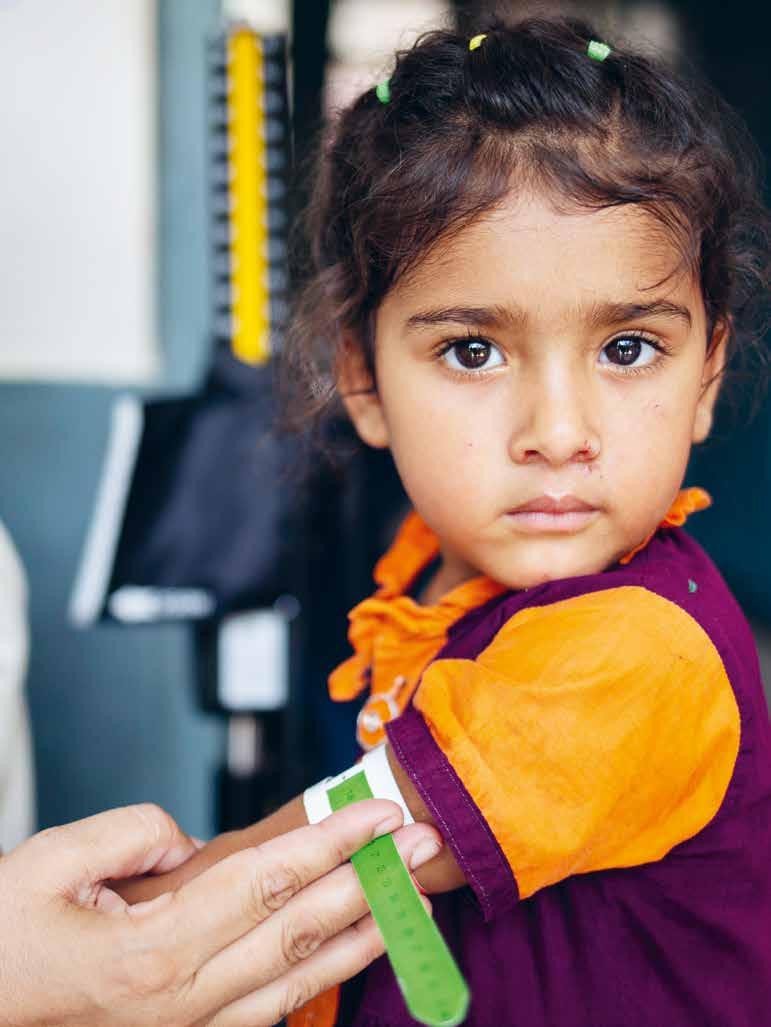

ANNUAL REPORT 2024
Photo: © Doctors of the World / Saiyna Bashir

Chair Doctors of the World Germany
Dr Peter Schwick

Director Doctors of the World Germany
François De Keersmaeker
Schneider
Dear readers, dear friends, dear supporters of Doctors of the World, it is no longer just crises and disasters that challenge us as a humanitarian organisation. Given the shortage of funding for humanitarian aid and development cooperation, it is becoming increasingly difficult to provide effective aid. Even institutions at home and abroad which have been reliable for many years have announced that they will be reducing or even cancelling their funding. At the same time, health facilities and medical personnel are often the target of military conflicts.
The number of people dependent on our support is rising. Increasing planning uncertainty and greater risks are adding to the burden for our teams.
Nevertheless, in 2024 we were able to carry out our activities in Germany and abroad with unrelenting commitment, running over 450 projects in more than 70 countries. On a political level, we have also continued to advocate for the right to healthcare for all.
Our projects in Gaza and Ukraine were once again in the spotlight. The wars are putting vast sections of the civilian popu-
lation in danger, including our teams on the ground. Our office building in Gaza City was destroyed at the beginning of the year, and many of our Palestinian employees have been displaced, some of them several times. Our sincere thanks and utmost respect go to our teams in both countries who continue to assist other people in the face of mortal danger and unimaginable adversity.
You can learn more about their impressive work in this report.
There are also rays of hope in our domestic projects, such as the eye consultations at open.med in Berlin. In addition to Munich, Stuttgart and Hamburg, we have opened another drop-in centre in Magdeburg, where we treat and advise people who have no access to medical care, or have difficulty accessing it. Our sincere thanks go to the many volunteer doctors, students and translators who once again lent a helping hand at all our locations!
Despite, or perhaps because of, the dramatic global situation, we remain confident and look forward to forging ahead with you by our side, full of hope and commitment – let us continue standing together for the human right to health!
Dr Peter Schwick and François De Keersmaeker


FOREWORD
Photo: © Simone
Photo: © ÄdW
MOLDOWA
UKRAINE HIBUKI THERAPY: A HEALING HUG
Many children in Ukraine have never experienced what it is like to live in peace. They and their parents live in constant stress and uncertainty. Many have been through traumatic events. Doctors of the World is therefore working to strengthen the mental health of children in the country – with the help of a sad-eyed, long-legged and cuddly toy dog.
Anger, silence, retreating inwards – these are just a few of the outward signs of the wounds that the war in Ukraine is leaving in the souls of children. This is why our teams are not just looking after their physical health, but their mental health
as well – and that of their parents. Our goal is to help people become more resilient, so they can get through the war in the best way possible and face the future with confidence—or at least with hope.
Our psychology specialists use methods that have already been tested in other crisis situations. One such method is the socalled Hibuki Therapy, which was developed in Israel. Hibuki comes from the Hebrew word for ‘hug’. It is a cuddly toy designed to help children cope with difficult situations and traumatic experiences. Every single detail of the toy has been carefully designed: sad eyes which are designed to evoke empathy, and large
“During these sessions, we all relax and take a deep breath” A 37-year-old mother of two sons
Examples of what we have achieved
In the three years since Russia's major offensive, more than 312,800 people have been provided with medical and psychological assistance.
The main providers of funds
German Federal Foreign Office: €3,100,000
German Federal Ministry for Economic Cooperation and Development [BMZ]: €1,200,000
ECHO: €191,116
Sternstunden e.V.: €300,000
Swiss Solidarity: €954,145
Else-Kröner-Fresenius-Stiftung: €148,353
Our many donors

floppy ears, which the children can hide behind and dry their tears with. The front legs are long and have Velcro fasteners so that the children can hang their Hibuki around their neck.
A soft toy as a therapeutic aid
Guided by Doctors of the World psychologists, the children form a bond with their Hibuki and must look after it. Taking on this responsibility is intended to boost their self-confidence. The Hibuki helps the children express and process their feelings. In a separate group session, parents can discuss how they are dealing with the consequences of war, the uncertainty, and the impossibility of making long-term plans.
“We’ve already been driven out twice since 2014. Moving house means stress for everyone. Especially when you know that your home is no longer there and you’ll never be able to return to it,” said the 37-year-old mother of two sons who took part in the Hibuki workshop. “It’s one thing for adults, but completely different for children. During these sessions, we all relax and take a deep breath.”
A young participant at a Hibuki workshop in Ukraine
Photo: © Doctors of the World
ETHIOPIA BEYOND BELIEF
In the Somali region of Ethiopia, distances are long and infrastructure is sparse. How Doctors of the World is helping women give birth safely.
“I come from Zimbabwe. What I’ve seen in the Somali region is beyond belief.” Shephard Chishaka, Doctors of the World’s local coordinator, finds strong words to describe the challenges in the region.
“Access to medical, social and other services is very, very difficult. Not least because of the climate. Our primary goal is to ensure that people in the under-served communities can access high-quality medical care.”
Avoiding complications during birth
A major problem is that there are not enough roadworthy ambulances in the region and the routes are often very long and arduous. This means that the lives of women who urgently need to go to hospital because of birth complications are at risk. It also means that newborns cannot be cared for adequately and quickly in an emergency.
Doctors of the World community mobilisers, who provide information about health issues in their villages and communities, therefore encourage pregnant women to visit a health centre as soon as they can. If possible, they should be ex-
“Our goal is to ensure that people in the under-served communities can access high-quality medical care.”
Shephard Chishaka, Doctors of the World’s on-site coordinator
Examples of what we have achieved
25,768 consultations, including 15,351 for children under the age of five, and 752 mental-health consultations
14 health centres supported, two mobile teams have provided medical care to people in remote areas
The main providers of funds
German Federal Foreign Office: €2,700,472.84
Oswald Stiftung [Oswald Foundation]: €50,000
Stiftung Zwei Freunde [Two Friends Foundation]: €15,000
Sternstunden e.V.
Our many donors

Where there is no other option, the mobile team of Doctors of the World in Ethiopia holds consultations outdoors. Members of must travel long distances in order to reach people in remote areas.
amined at least eight times during their pregnancy, so that complications can be detected and treated in time. There are still many home births, but women are advised to give birth in a health centre.
Better care in a health centre
Fadumo Omar Sigale, from the village of Elweyne, is one of the pregnant women assisted by Doctors of the World. “I remember giving birth to my last baby before Doctors of the World became involved. There were no hand-washing stations, no proper care and I didn’t feel safe. But now it’s so much better.” When she was pregnant with her youngest child, Fadumo Omar Sigale regularly went to
the health centre where she received ultrasound examinations and other procedures.
“Two months ago, I gave birth in the health centre, and it was a blessing. I was given free medical care, food and a kit with postnatal essentials. When I took my baby in my arms, I knew that everything had gone well and that my child was healthy. My child also received important vaccinations.”
Photo: © Doctors of the World
SYRIA “YOU HAVE TAKEN A HUGE WEIGHT OFF MY SHOULDERS”
Millions of people have been displaced by years of civil war in Syria. Many have sought refuge in the Idlib governorate in the north of the country. Chronically ill, disabled as well as other patients receive help in our clinic.
Mariam Abeer (name changed) has been blind since birth. The 42-year-old lives with her brothers in a trailer. Two of her brothers also have a visual impairment. The third is paralysed down one side, has diabetes and is bedridden. The siblings only survive thanks to the youngest brother who, with his wife and six children, takes care of them as best he can.
Mariam Abeer's health had steadily worsened in recent months. Chronic asthma plagued her so much, especially at night,
that she struggled to breathe and her lungs became progressively weaker.
She can now breathe freely again Accompanied by her brother and sister-inlaw, Mariam Abeer went to the health centre run by Doctors of the World in the middle of a camp for displaced people. After a thorough examination, she was given medication and an inhaler for her coughing fits.
Doctors of the World staff also recognised the extent to which Abeer’s entire family needed help. Together with other humanitarian organisations, the supported the siblings – providing them with a wheelchair for example. Mariam and her brothers finally felt seen and cared for.
Examples of what we have achieved
Over 178,000 medical and psychological consultations in six healthcare facilities
125 self-help groups have been set up, where mothers can discuss nutrition and physical as well as mental health issues, and where women can support each other in a protected environment
The main providers of funds
German Federal Foreign Office: €5,598,309
German Federal Ministry for Economic Cooperation and Development [BMZ]: €1,440,000
Sternstunden e.V.: €100,000
Our many donors
The follow-up examination showed a significant improvement in Mariam's condition. For the first time in months, she was able to breathe freely again. This also had a major effect on her mental health. “They took a huge weight off my shoulders,” said Mariam Abeer.
“This treatment means much more than better health. It means dignity, security and the knowledge that even in the darkest times there are people who are willing to help.”
Mariam Abeer, patient
A member of Doctors of the World staff examining a child. It is particularly difficult for refugees to access medical care.
© Dünya Doktorları / Doctors of the World Türkiye
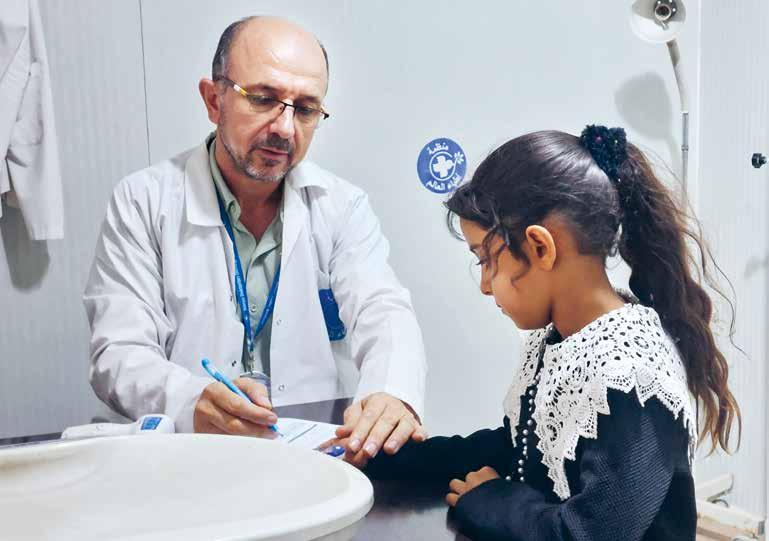
Photo:
PALESTINIAN TERRITORIES
CONSTANT STRESS AND FEAR
Bombing and gunfire every night, a completely broken health system, the few remaining hospitals completely overwhelmed: how the humanitarian situation in the Gaza Strip – and the West Bank – continued to deteriorate in 2024, and what Doctors of the World is doing to help.
Louise Bichet, project manager for the Middle East at Doctors of the World France, reports:
The impact of Israeli attacks on the civilian population has become increasingly serious since the beginning of the summer. As the border crossings have been closed, barely any medical supplies and food can be delivered to Gaza. Vaccina-
tions can no longer be administered. Infants under the age of five are often not vaccinated and are therefore particularly vulnerable to epidemics.
The number of malnourished children is increasing due to inadequate food supply. 30% of children under the age of two are now affected.
In Doctors of the World’s medical centres, we see that chronically ill people are no longer able to access adequate medical care. Their health is worsened by unsuitable living conditions. We need a stable and safe environment that does not change every week so that we can treat our patients effectively. There are not
Examples of what we have achieved
In Gaza
Over 400,000 medical and psychosocial consultations
Over 20,000 displaced people provided with parcels of hygiene supplies (towels, toothbrushes, toilet paper, menstrual products, soap etc.)
In the West Bank:
Over 6,800 mental-health consultations
The main providers of funds
Federal Ministry for Economic Cooperation and Development:
€1,708,900
Our many donors

Despite the constant danger and unbearable living conditions, Doctors of the World staff are working tirelessly for others, such as here in Rafah.
Photo: © Doctors of the World Switzerland
enough tents to accommodate people. Deceased patients are not counted as war victims. The number of civilian victims is therefore much higher than reported.
Relieving mental distress
In addition to illnesses and injuries, we also treat mentally ill patients. Families, especially children, are often severely traumatised. They live in constant stress and fear. Children who are now at a crucial stage in their cognitive-emotional development may suffer permanent damage. Our team supports the young patients as best it can. The mental health of our members of staff is also under strain. Just like the civilian population, they too are experiencing the war up close.
The situation in the West Bank
In addition to the dramatic situation in Gaza, the West Bank must not be forgotten. There has been a significant increase in the number of incidents of violence committed against the Palestinian civilian population by Israeli settlers. Furthermore, the Israeli army is coming down very hard on Palestinian villages.
YEMEN ENSURING SURVIVAL IN TIMES OF WAR
In a catastrophic humanitarian situation such as that in Yemen, any aid effort can sometimes seem like a drop in the ocean. An example from the south of the country shows how it can change families’ lives for the better.
Abdul Rahman is four years old and knows nothing but war. His parents had to flee with him and his three siblings from the port city of Hodeidah and seek protection in the Aden region. Before they fled, Abdul’s father was a fisherman, but it was difficult for him to find a new job in Aden. His mother tried to earn money from occasional jobs. The family often went hungry, which affected the children's health – to such an extent that
Examples of what we have achieved
193,494 medical examinations
1,487 births attended in the health centres
28,884 children examined for their nutritional status
151 survivors of gender-based violence supported
20 health centres/clinics supported
Abdul was ultimately severely malnourished.
In total desperation, Mrs Rahman took her child to a health centre supported by Doctors of the World. Abdul was immediately admitted to the therapeutic nutrition programme. He was given Plumpy’Nut (an energy-rich peanut-based paste), vitamins and medication. Abdul’s nutritional progress was checked weekly over two months, and he was soon much better: he gained weight and became healthy.
“You made it possible for my son to recover,” said Mrs Rahman, thanking the Doctors of the World team.
The main providers of funds
German Federal Foreign Office:
€3,900,000
Sternstunden e.V.
Our many donors
War as the cause of hunger and lack of supplies
The Rahman family is just one of the hundreds of thousands of families in Yemen who need help to ensure their survival. They are living through one of the world’s worst humanitarian disasters. The root cause is the war that has been fought between militant groups and foreign actors on Yemeni soil since 2014.
Tens of thousands of civilians have been killed or injured. Around 3.3 million people have had to flee their homes. About 80 percent of the population depends on
support from aid organisations. Millions of men, women and children do not have enough to eat. The economy and public administration have collapsed, the infrastructure has largely been destroyed, and only half the health facilities are fully operational. Serious infectious diseases such as cholera are rife.
The teams supported by Doctors of the World in Yemen have been providing medical assistance and working in local health facilities to improve access to healthcare for all since 2007.
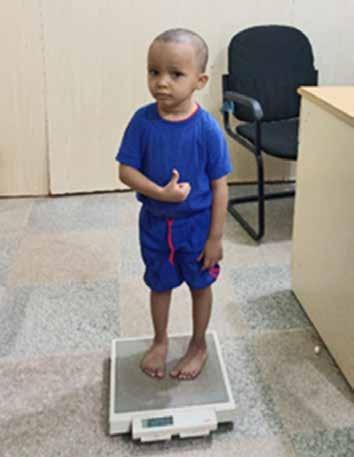
Four-year-old Abdul Rahman has successfully put on weight thanks to a special nutrition programme. Poor nutrition is one of the biggest problems in Yemen, especially for children.
Photo: © Doctors of the World
GERMANY HEALTHIER INTO THE FUTURE
In their practices and mobile clinics, Doctors of the World’s teams solve more than just medical problems. Impressions from our consultation hours in Berlin and a mobile clinic in Munich.
“Life without glasses is hell,” as a patient of open.med Berlin puts it at an eye consultation. The Mehrblick organisation today provides free visual aids for people with no health insurance. Optician Alexander Andrich methodically changes the lenses in the test glasses and asks the patient to read numbers from a chart. It does not take long and the patient can soon read the smallest line easily. After just a few minutes, he leaves the practice beaming happily and wearing a suitable
style from a range of donated glasses.
A man in his mid-50s – who wants to be called Hardy – is also pleased with his consultation. He is homeless and currently has no health insurance. As he cannot see very well, he has difficulty filling in important forms that could improve his situation. The new glasses solve this problem. “Great, fantastic – now I can read again,” says Hardy happily.
A patient in her mid-40s from a central African country has a specific goal: finally be able to follow her German course properly. “You're doing a great job,” she praises the team.
Examples of what we have achieved
In our surgeries and mobile clinics in Munich, Berlin, Hamburg and Stuttgart, 2,254 patients have been treated and received 7,403 consultations
The main providers of funds for our domestic programmes:
24guteTaten e.V.: €44,370
Borough of Lichtenberg, Berlin: €36,884
Deutsche Postcode Lotterie: €350,000
Dr. Heinz Lux-Stiftung [Dr Heinz Lux Foundation]: €20,000
State capital Munich: €84,786
SDK Stiftung [SDK Foundation]: €14,000
Stiftung Antenne Bayern hilft: €50,000
Stiftung Zwei Freunde [Two Friends Foundation]: €10,000
SZ Gute Werke e.V.: €30,000
Our many donors
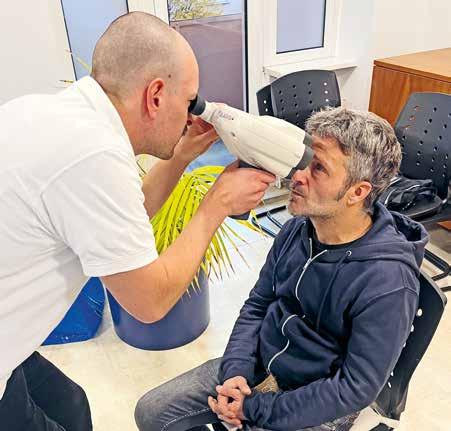
Mobile service for homeless people
In Munich, the Doctors of the World team regularly deploys a bus converted into a mobile clinic outside an emergency shelter for homeless people. One summer evening, Oleg Stanciu (not his real name) comes for a consultation. He is a 32-yearold Romanian and works on a building site in Munich where he had injured his ankle early that morning. Even though Oleg Stanciu is in great pain and barely able to walk, he carried on working. He cannot afford to forgo his wages because he has no employment contract and no social security. Oleg Stanciu has been making ends meet with irregular jobs such as this for 15 years.
During an eye consultation at open.med Berlin Lichtenberg, a volunteer staff member examines the eyes of a patient. Without this service, he and other visitors to the practice would not have suitable visual aids.
Once open.med project manager Annemarie Weber had spoken to Oleg Stanciu and explained his options, volunteer doctor Kristina Huber examined his leg and took care of it as best she could. She advised him to cool his ankle, put it up and rest it. “I realise that, under the circumstances, he can’t really act on these recommendations. He’ll probably be working hard on the building site again tomorrow.” At least Oleg Stanciu now knows who he can turn to. In addition to the bus, he can also visit open.med’s medical practice on Dachauer Straße.
Photo: © Doctors of the World
GERMANY OPEN.MED OPENS IN MAGDEBURG
Magdeburg now has a Doctors of the World practice. Like the open.med practices in Munich, Berlin and Hamburg, full-time and volunteer staff here help people who would otherwise not receive medical care.
“We really want institutions like this to become superfluous,” said Professor HeinzJochen Zenker (member of the Doctors of the World Board of Directors) at the opening ceremony of open.med Magdeburg. The surgery offers free medical treatment and social counselling for all people who do not have adequate health insurance cover. These include refugees and homeless people, EU citizens who are not working in jobs covered by social security contributions, and German nationals who cannot afford the high health insurance premiums. Whatever the rea-
son why people cannot attend a regular doctor’s office, “for us, health is a fundamental human right and one which must be upheld,” said Professor Zenker.
Doctors of the World estimates that several hundred thousand people fall through the cracks of the regular healthcare system. There are no accurate, reliable figures because official statistical surveys do not cover the majority of those affected.
Further specialist consultation hours planned
Staff from local partner organisations, local politicians, members of the state parliament and interested doctors were among the numerous guests at the opening ceremony. In his opening address, Dr Ingo Gottschalk (Magdeburg's head of the
”For us, health is a fundamental human right and one which must be upheld.“
Professor Heinz-Jochen Zenker, member of the Doctors of the World Board of Directors
DOMESTIC

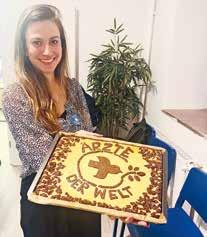
department for social welfare, youth and health) welcomed Doctors of the World and stressed the need for such a service, especially in view of the huge increase in the number of homeless people in the city.
Dr Nicole Primas of the Saxony-Anhalt Dental Association was delighted that going forward, volunteer dentists will be able to treat patients not just at the railway station, but also in the comfortable setting of open.med Magdeburg.
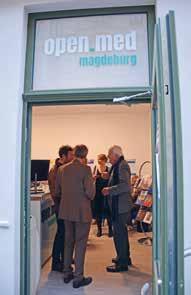
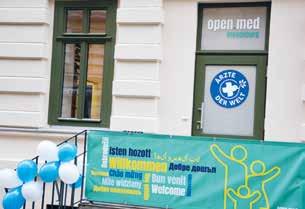
And the team has additional plans: “In the future, we want to offer paediatric and gynaecological care in addition to general medical and dental consultations,” says project manager Fabian Kunze.
Another important goal of the service is to get non-insured people back into the regular healthcare system. The Doctors of the World team is also supporting its patients in this regard. The practice began to regularly operate in early 2025.
Images from the grand opening of the new open.med clinic in Magdeburg
Photo: © Doctors of the World
GERMANY
EMPOWERING WOMEN REFUGEES
Female residents of German accommodation centres for refugees have often experienced terrible things. At the same time, they are not fully aware of what help is available to them. Doctors of the World’s reach.out team takes care of people in so-called Ankerzentren [anchor centres]. A key aspect of the Doctors of the World reach.out project is to prevent violence against women and provide support for survivors.
Annet Kiwu regularly suffers from severe nightmares and sleep problems. Like so many women in refugee shelters, she has gone through some traumatic experiences. As an adult woman, she narrowly escaped forced genital mutilation in her home country and had to flee. Doctors of the World’s reach.out team helped Annet Kiwu get an appointment with a female
psychologist of Caritas’ social psychiatry service. What happens next for her depends on an interview at the BAMF, the Federal Office for Migration and Refugees, which will decide on her application for asylum. Thanks to the information she has received from the reach.out team, she now feels well prepared for her interview.
Informing and building self confidence
The last in a series of workshops offered by Doctors of the World in refugee centres began with a round of introductions to create an atmosphere of trust and openness. Reach.out experts Michelle Kerndl-Özcan and Lea Dannert spoke about an individual’s rights, sexual health, the procedure for seeking asylum and the interview at the BAMF. This was impor-
“The workshops boosted my self-esteem and my self-confidence. I feel great now because I can stand up for myself.”
A participant at a reach.out workshop
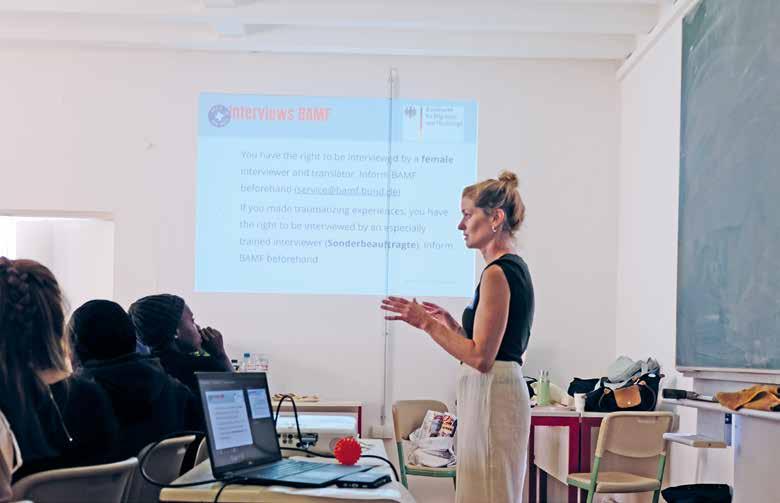
At a workshop, reach.out project manager Michelle Kerndl-Özcan gives women refugees advice about the asylum procedure and addresses topics such as mental health and protection from violence.
tant information and the women listened intently. The content was later sent to the participants on their mobile phones so that nothing would be forgotten. "The workshops boosted my self-esteem and
my self-confidence. I feel great now because I can stand up for myself” a participant said. "They provided me with so much information that I now know where to go if I need help."
Examples of what we have achieved
216 women advised and, where necessary, provided with further care
31 workshops held at various locations
The main providers of funds
Heidehof Stiftung [Heidehof Foundation]: €50,000
UN Refugee Aid: €15.000
Our many donors
Photo: © Doctors of the World
ADVOCACY ACHIEVING MORE TOGETHER THROUGH POLITICAL ACTION
In addition to its projects, Doctors of the World also campaigns politically for healthy living conditions for all – in Germany and throughout the world.
Concerns and demands about migration and asylum policy went largely unheard in 2024. The political climate and public debate in Germany had become very intense and shifted far to the right.
Nonetheless, with the upcoming parliamentary elections in mind, Doctors of the World once again pulled out all the stops to push for the outstanding promises made in the coalition agreement to be implemented:
change the legal obligation to pass on personal data of people without regular residence status to the immigration authorities, so that the former are no longer prevented from seeking medical care
make healthcare for asylum seekers less bureaucratic and bring it into line with the case law of the Federal Constitutional Court
introduce language mediation in healthcare
review access to health insurance and care for people with uncertain insurance status (particularly homeless people) and clarify it in the interests of those concerned
Unfortunately, for the reasons mentioned above, our efforts were ultimately unsuccessful, partly because disputes within the coalition led to major reforms being delayed. After the existing government was dissolved prematurely in November, the demands finally became unachievable.
POLITICAL AND PUBLIC ENGAGEMENT
Together with other organisations, Doctors of the World organised a rally for a just peace in the Middle East.
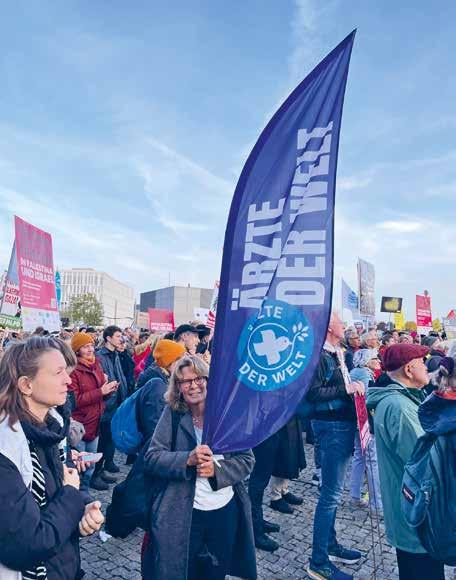
Against this backdrop, we launched the “Indivisible Health” initiative in December. It is committed to tackling structural problems in the health system and to involving all people, rather than pitting different groups against each other.
Protest against the war in the Middle East
In light of its activities in the Palestinian Territories (see pages 12 and 13 of this report), Doctors of the World also campaigned for peace in the Middle East, the protection of civilians, and free access for humanitarian aid to the Gaza Strip. Among other things, we organised a rally in Berlin with other civil society organisations.
Our demands: an immediate and comprehensive ceasefire, and no exports of weapons that could be used against the civilian population.
Nearly 40 organisations had called for the rally, including Amnesty International, medico international, CARE Deutschland, the Deutsch-Palästinensische Gesellschaft [German-Palestinian Society] and Israelis for Peace. The common aim: to set an example, in a polarised climate, for unconditional humanism, compliance with international law, and the protection of all civilians.
Photo: © Doctors of the World
IMPACTING PUBLIC DISCOURSE MOBILISING PEOPLE
How Doctors of the World uses targeted public relations and transparent communication to raise awareness of global health problems and mobilise politicians and civil society. A conversation with campaign and events consultant Hannah Eger and press officer Stephanie Kirchner.

Healthcare is a human right. Doctors of the World’s communications team aims at fostering greater awareness of this and initiating tangible changes.
For example, we run campaigns on social media that draw attention to specific issues. Through events and rallies we drive home our concerns and mobilise the public.
Stephanie Kirchner: We also regularly receive enquiries by journalists on health issues. Their reports help us reach a wider audience and inform other target groups about our topics.
Can you give an example of such collaboration with the media?
What goals does Doctors of the World pursue with its communications work and how do you go about achieving them?
Hannah Eger: Healthcare is a fundamental right. We therefore see it as our task to make society aware of the fact that the right to a healthy life must be guaranteed throughout the world. To spread our messages and report on our work, we use all possible channels, including social media, our website, a newsletter and press releases.
SK: The coverage about actor Heinz Hoenig was an excellent opportunity to highlight the issue of people without health insurance in Germany. Hoenig was seriously ill but had no health insurance and could not afford to pay for the treatment he needed from his own pocket. We were able to use the temporary media focus on the problem to provide information about the difficult circumstances of our patients, our work and potential solutions in interviews with newspapers and on the radio.
Photo: © Doctors of the World

Süddeutsche Zeitung reported on Heinz Hoenig's case and also interviewed Doctors of the World.
Photo: © Doctors of the World
Where does the information you disseminate come from?
HE: Our communications are evidence-based, which means that our information always comes directly from our projects. We use both quantitative and qualitative data collected by our teams. Field reports are particularly important when statistics are missing or do not cover certain aspects. Our information about Gaza, for example, comes directly from our teams on the ground who observe and document the situation. This procedure ensures that our communication is based on reliable and verifiable data.

WDR Radio interviewed Doctors of the World press officer Stephanie Kirchner about people without health insurance.
Photo: © Doctors of the World
How do you know that your communications work is effective? Is it something you can measure?
SK: It's not that easy. We use a variety of tools. One, for example, measures the scope and type of reporting. We consider quantitative aspects, such as the number of media references, and qualitative aspects, such as register and context. We also analyse the interactions and activities on Instagram, Facebook, LinkedIn and Bluesky. We can also draw conclusions from the traffic on our website. Although the impact of our communications work is difficult to measure, we are seeing an increase in numbers and qualitative improvements, which show that our issues are being seen and heard.
WORKING TOGETHER FOR A GOOD CAUSE
The past year has once again spectacularly shown that solidarity is more important than ever. Our donors have made it possible for our teams to defy the odds and stand up for people in need. Thank you for this magnificent effort!
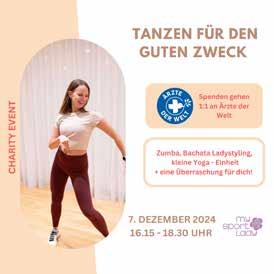
Getting involved in a good cause makes many of our donors happy – especially when they can work together. Once again we were impressed by the variety of fundraising activities we saw in 2024. Shall we dance together and do some good at the same time? This was the idea of Stephanie Schulz, who invited friends, ac-
Stephanie Schulz organised a dance event to raise funds for Doctors of the World.
Photo: © Stephanie Schulz
quaintances, family and colleagues to an afternoon of dancing. They all enjoyed the lively rhythms of Zumba and Latin American dances, and relaxed afterwards with some calmer yoga exercises. The participants were enthusiastic and donated generously to Doctors of the World projects.
DONATE
www.aerztederwelt.org/
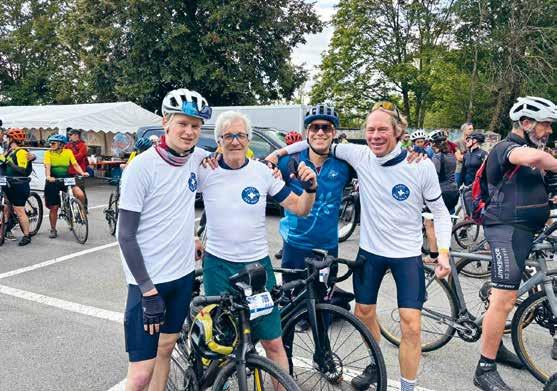
Make a difference with team spirit and muscle power
Our director, François De Keersmaeker, and our Chair, Dr Peter Schwick, needed even more stamina when they took part in the Doc'Riders bicycle tour together with the Chairs of Doctors of the World UK and Switzerland. They each had to cover 200 kilometres in under 24 hours, the aim being to raise as much money as possible for Doctors of the World. The challenge began and ended in the Belgian town of Marche-en-Famenne. The teams crossed the hilly regions of the Pays de Famenne, climbing the equivalent of more than 2,500 metres.
Team spirit was also plain to see during the SDK Stiftung's Christmas campaign. SDK’s employees donate to Doctors of the World every year.
In 2023, their contribution went towards setting up our new drop-in centre in Berlin, for example, and they once again made the wishes of our patients come true in 2024.
All this shows that creativity knows no bounds. Have a look at the Doctors of the World website to see how easy it is to get involved. We look forward to seeing what creative activities our donors come up with this year!
On behalf of our patients, be they on our international projects or here in Germany, we would like to thank all those who have supported us so much!
The Doctors of the World Doc’Riders team cycled several hundred kilometres.
Photo: © Doctors of the World
FINANCIAL REPORT
In 2024, Doctors of the World Germany was again able to rely on financial support for its worldwide humanitarian work. Thanks to our long-standing partnerships with the Federal Foreign Office, the Federal Ministry for Economic Cooperation and Development (BMZ) and Sternstunden e.V., we were able to continue providing medical aid in our project countries: Ethiopia, Yemen, Nigeria, Ukraine and the Central African Republic. Furthermore, thanks to the support of our institutional donors, we have been able to pursue our commitment to countries with long-term crises, such as Iraq, Afghanistan, Pakistan, the Palestinian Territories and Syria. The BMZ continued to provide financial support for projects in the Palestinian Territories and Ukraine in 2024.
The inflow of unrestricted donations was roughly the same as the previous year and amounted to almost 3.21 million euros (an increase of approx. 1.5%). With regard to the money received for specific purposes, there was substantial income for Greece (especially for the polyclinics), Yemen and the Palestinian Territories. This was made available to the international network of Doctors of the World for emergency and crisis aid. In addition to the chapters in France, Greece and Spain, Belgium (for Morocco) and Türkiye were also supported with donations for regions in crisis and domestic programmes. As in previous years, there was a high level of donations for our projects in Ethiopia and Ukraine.
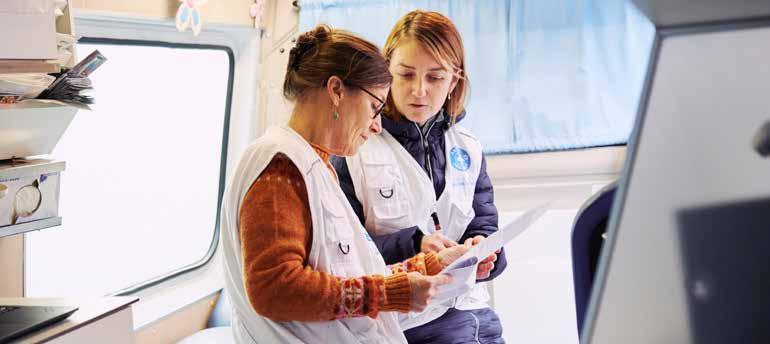
Photo: © Doctors of the World / Katharina Sellin
For the 2024 financial year, Doctors of the World Germany had a total income of EUR 32,660k (previous year: EUR 35,041k). Sales revenue decreased by approx. 7%. The financial statement shows a net loss of EUR 669k for the year (previous year: EUR 0k). Income from general donations amounted to EUR 4,733k (down by approx. 15% on the previous year). Revenue from public grants amounted to EUR 26,884k in 2024 (EUR 27,660k in 2023). These funds mainly came from the Federal Foreign Office and the BMZ. More than half the project expenditure was passed on to our French parent organisation Doctors of the World France, which transferred the (earmarked) funds to the projects without deducting its own advertising and administrative costs.
Total assets decreased by EUR -1,550k or -17.2% on the previous year to EUR 7,470k (previous year: EUR 9,020k). Fixed assets increased by EUR 80k or +30.0%, mainly due to additions to intangible assets and for operating and office equipment. Trade receivables increased by EUR 653k or +70.0% in the context of project services. The equity ratio is 26.8% (previous year: 29.6%). Overall assessment of the situation: we consider our net assets, financial position and profit/loss situation to be satisfactory.
Summary: in 2024, Doctors of the World Germany continued to receive financial support, particularly from state funds, to provide medical aid in crisis areas. Despite a decline in sales and a net loss for the year, the financial situation remains stable. The total budget for 2025 is down by 12%, which is why cost controls and structural adjustments are planned. Cuts in the state development budget are a challenge, but thanks to its reserves, the organisation remains financially viable.
FORMS OF ADVERTISING
In order to achieve greater financial security for our work as an organisation and to continue expanding it over the coming years, we communicate regularly with existing and potential new supporters by means of fundraising letters, electronic messaging, telephone or in person. Our team is also an important point of contact for the questions and concerns of people who are interested in Doctors of the World. The donations received by Doctors of the World Germany are independently checked and evaluated by the DZI [German Central Institute for Social Issues]. The annual award of the DZI’s seal of approval shows that our organisation handles the donations entrusted to it responsibly and prudently, and communicates objectively and truthfully in its information and advertising material.
In previous years, there have been significant increases in project-specific donations, triggered by the war in Ukraine and the earthquake in the Türkiye/Syria border region. In 2024, there were no catastrophes that had an exceptional effect on donation behaviour, which led to a decline in the number of our donors and, in particular, new donors. We had 27,126 donors in 2024 (32,456 the previous year), a fall of almost 16%.
As the recruitment of permanent donors via street advertising was put on hold in 2024, the number of permanent donors also fell slightly to 8,472 people (8,743 the previous year). The recruitment of permanent donors is to be resumed from
2025. In 2024, as in the previous year, investments were made in the recruitment of new donors through mail drops, and personal bequests, major-donation fundraising and corporate donations were expanded. Furthermore, a website relaunch and a CRM migration project were set in motion with the aim of having a longterm positive impact on fundraising.
In 2023, the proportion of total expenditure spent on advertising and administrative expenses stood at
9.96 %
STAFF AND REMUNERATION
The remuneration of Doctors of the World Germany staff is based on an inhouse salary model and depends on task content, area of responsibility and relevant professional experience. Pay increases are based on public-sector wage settlements. In 2024, in total, the five highest total annual salaries amounted to 364,006.72 euros (director and four full- and part-time executives) with an average full-time salary of 6,530.31 euros. The average salaries at specialist/advisor level or assistant/administrative level are
4,537.55 euros and 3,827.91 euros respectively.
For data protection and labour law reasons, the salaries of individual members of staff cannot be published. The Chair of the Board of Directors receives no remuneration, not even for activities that go beyond the remit of the Board of Directors’ general activities. All other members of the Board of Directors also work on a voluntary basis and therefore receive no remuneration.
BALANCE SHEET AS AT 31 DECEMBER 2024.
Notes:
The balance sheet represents the association’s assets and financial situation as at the 31.12.2024 reporting date. Fixed assets essentially include IT equipment and medical devices. Current assets include, in particular, bank balances and grants from project partners.
Equity corresponds to the association's assets, which are intended to serve, inter alia, as reserves and security. Unspent donations refers to commitments for project expenditure. Provisions mainly includes holiday entitlements as well as expenditure for the annual audit. Payables are outstanding payment obligations.
INCOME 2024
1.2
Sternstunden e.V. for Afghanistan / Pakistan
Sternstunden e.V. for Syria
Sternstunden e.V. for Ukraine
Federal Foreign Office for Ethiopia 2,700,472.84
Federal Foreign Office for Yemen 3,900,000.00
Federal Foreign Office for Nigeria 1,236,000.00
Federal Foreign Office for Pakistan / Afghanistan 3,000,000.00
Federal Foreign Office for Syria
Federal
BMZ for the Palestinian Territories 1,708,900.00
BMZ for Syria 1,440,000.00
BMZ for Ukraine
SWISS Solidarity for Ukraine
2.
4. Allocations
Notes:
Income: Donations and grants consist of project-specific and free donations, donations from non-governmental organisations, grants from public funds, financial penalties and donations in kind.
Expenditure: Expenditure is categorised in accordance with the Seal of Approval guidelines of the DZI (German Central Institute for Social Issues). In this respect, the expenditure has been broken down into the abovementioned categories.
AUDITING BY THE STATUTORY AUDITOR
Doctors of the World e.V. has voluntarily had its accounts audited pursuant to §§ 317 ff. of the HGB [German Commercial Code]. The audit covered the accounting records and annual financial statement as at 31 December 2024 as prepared in accordance with German commercial law, including the activity report for the 2024 financial year, and management compliance in accordance with § 53 HGrG [German Law on Budgetary Procedures].
The audit concluded that, in all material aspects, the annual financial statements comply with the requirements of German commercial law as applicable to corporate entities, have been compiled in compliance with the German principles of proper accounting, and give a true and fair view of the assets, financial position and profit/loss situation of the association as at 31.12.2024 and for the 2024 financial year. On the whole, the activity report gives a true picture
Programme expenses include direct project expenses pursuant to the Articles of Association.
Administrative expenses relates to the ongoing costs of maintaining the branch office.
* Calculation of the proportions and percentages is based on the current DZI concept for advertising and administrative expenses. In this respect, the entry Allocations to project reserves is not part of total expenditure and is not included in the calculations.
of the position of the association. In all material aspects, this activity report is consistent with the annual financial statements, complies with German legal requirements and accurately presents the opportunities and risks of future developments.
Various instruments have been established as standard in-house control mechanisms within the organisation. In addition to various guidelines (anti-corruption, procurement and signatory authorisation, travel expenses etc.), the four-eyes principle is firmly anchored in the procedures and processes at all levels. In this regard, the high demands on control and transparency are increasingly supported and professionalised by digital systems. Furthermore, an independent ombudsperson is available as an external point of contact for reporting possible instances of misconduct confidentially and anonymously.
PROJECTS WITH GERMAN FUNDING
AFRICA
€6,557,259
Ethiopia
€3,284,268
Nigeria
€1,195,702
East Africa
€3,936
Morocco
€1,348
Central African Republic
€2,066,096
Africa (general)
€5,909
EUROPE
€7,811,105
Germany
€1,212,195
Greece
€110,005
Ukraine
€6,488,905
MIDDLE EAST
€13,185,042
Iraq
€100,195
Yemen
€3,980,676
Near and Middle
East
€7,996
Palestinian Territories
€1,775,814
Syria
€7,314,669
Türkiye/ Syria
€5,693
ASIA
€3,131,057
Afghanistan/ Pakistan
€3,121,950
Cambodia
€7,389
Asia (general)
€1,719
THE DOCTORS OF THE WORLD GERMANY ASSOCIATION
The General Assembly is the supreme controlling body of Doctors of the World Germany.
The General Assembly was held as a video conference and in person on 28 June 2024. Twenty-four members of the association were represented by voting rights. At the time of the General Assembly, 85 members were eligible to vote. The actions of the Board of Management were approved and the 2023 financial statements were confirmed unanimously, with no abstentions. The external auditor, Mr Köhl, drew a positive conclusion for the association: the annual results are balanced and the association is in a solid financial position. Dr Peter Schwick reported on developments in the domestic programmes and projects abroad. He mentioned that the open.med Munich project had been awarded the Berliner Gesundheitspreis [Berlin Health Award] and announced the opening of a medical drop-in centre in Magdeburg.
Volunteer members of the Board of Directors
Dr Peter Schwick (Chair), Thomas Bader, Peter Frank, Günther Fröschl, Sybil Schulz, Birgit Spiewok, Prof. Heinz-Jochen Zenker, Tabea Klaes (newly elected), Marionka Pohl (newly elected), Max Simontowitz (newly elected).
In accordance with the articles of association, the Volunteer Board is responsible for the day-to-day business of the association and oversees its proper implementation.
Volunteer members of the Special Supervisory Body (BAO) (elected by the General Assembly)
Axel Ebert, Otto Neuer, Stefanie Ziegler
The BAO's tasks include advising and overseeing the Board of Directors on matters relating to the management of the association and its strategic direction, compliance with the annual budget, and the remuneration and expenses allowances of members of the executive body.
Memberships
VENRO (Association of German Development and Humanitarian Aid NGOs)
Q!SH (Qualitätsinitiative Haus- und Straßensammlung e.V [Quality Initiative for Home and Street Collection])
Nord Süd Forum München e.V.
We are running 456 projects
27,000+
We would like to thank our donors.
Around permanent donors stand reliably by our side.
8,472
In Germany we have treated and advised
2,254 patients in our surgeries and treatment buses in Munich, Berlin and Hamburg.
Our teams in Germany have given
7,403 consultations
170 network practices,
159 We would like to thank over volunteers and who make our work in Germany possible.
Ärzte der Welt e.V. / Doctors of the World Germany
Munich office:
Landsberger Str. 428, 81241 Munich
Tel.: +49 (0) 89 45 23 081-0 info@aerztederwelt.org www.aerztederwelt.org
Berlin office: Berlin Global Village Am Sudhaus 2 12053 Berlin
Donation account
Deutsche Kreditbank (DKB)
IBAN: DE06 1203 0000 1004 3336 60 BIC: BYLADEM1001
Ärzte der Welt e. V. is recognised as a non-profit organisation. Donations are tax deductible.
Doctors of the World handles donations carefully and responsibly. In recognition of this we receive the DZI Seal of Approval and a donation certificate from the Deutscher Spendenrat every year.
Imprint
© Doctors of the World Germany
Responsible in the sense of the German press law [Pressegesetz] Dr Peter Schwick (Chair of the association)
Editorial staff
Carolin Dworzak
Stephanie Kirchner
Ute Zurmühl
As of July 2025
Cover Photo © Doctors of the World / Charsadda Saiyna Bashir
Design MediaCompany GmbH
Printing Esser printSolutions GmbH
Visit our website www.aerztederwelt.org/info/jahresbericht for further information about our activities in 2024.
